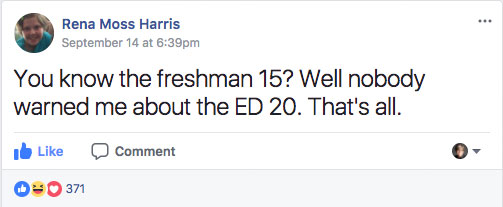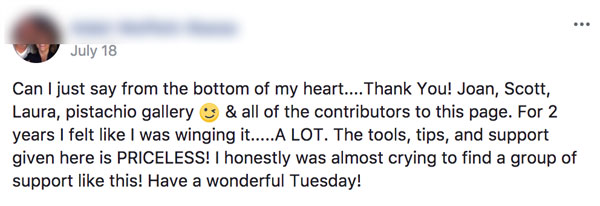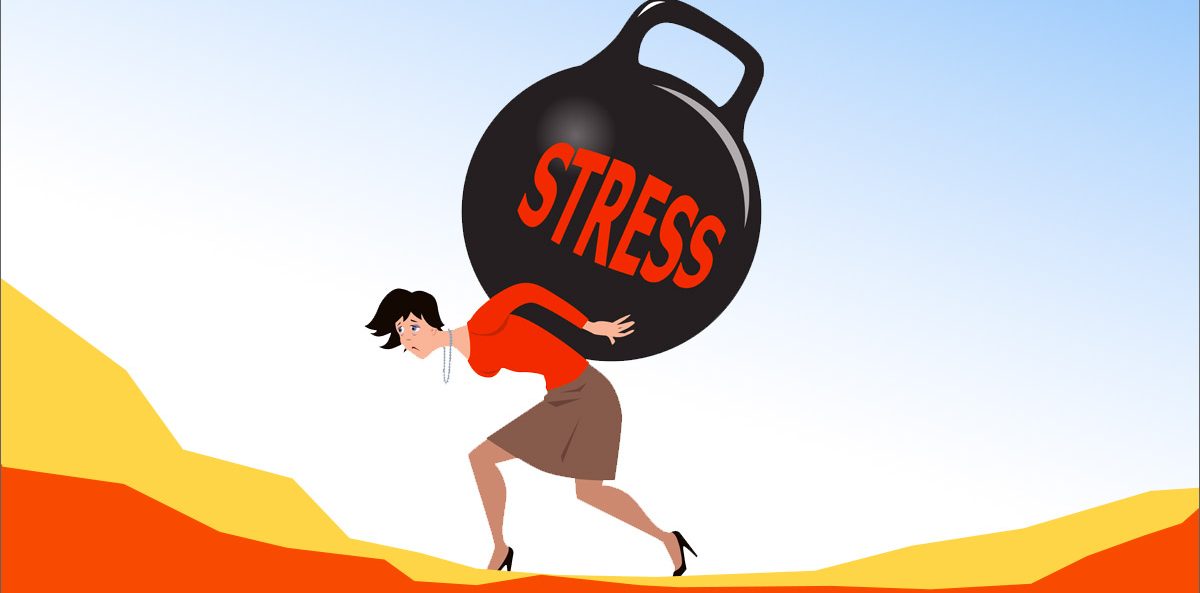I knew what she meant the moment she hit “post.”

If you’re unfamiliar with the “freshman 15,” it’s all about that first year of college…. Too much pizza and beer. A lot of stress. And 15 pounds gained.
So this is the “Executive Director 20”.
Nothing in the Thriving Nonprofit Facebook group (my free Facebook group for nonprofit staff and board leaders which you can join here) has ever struck a chord quite like this. 371 likes and counting.
Plus, more than 80 folks weighed in with comments (sorry, couldn’t resist the pun.) I have a feeling they’ll resonate with you.
- “Per year?”
- “Or the one meal per 14 hour day which may be at 9 pm and will be fast food, because it’s easy and you’re starving. The rest is sugar and caffeine.”
- “Grrreaattt. another job perk!”
- “It’s all the drinking”
- “Make it 40 for me!”
- “Totally real. I think it’s from being chained to the desk for 40+ hours per week, stress, and being to tired to cook good food when I get home. Chipotle has been very accommodating since this job started.”
- “Don’t forget the ED blood pressure meds & antidepressant lol or is that just me?”
- “For me, first time ED following the founder… ED 35, migraines, bronchitis, six months chronic back pain, some other stuff I can’t remember. Trying to get some sort of handle on managing the stress and pressure, and loneliness.”
- “The comments on this thread are crazy. I really thought it was just me.”
While some of these comments illustrate the sense of humor that I really appreciate in nonprofit leaders, others border on heartbreaking. Folks are working their asses off (hope I’m not offending anyone but that feels like the real deal phrase) and working themselves into the ground.
I get it. I know I work too hard too. Just the other day I wrote the words “self care” and for some reason my iPhone autocorrected to “self scare”.
Clearly, many of you are stressed out beyond all reason. It’s not healthy and it’s not good.
But what can we do about it?
THE KEYS TO HAPPINESS
Last night, my wife and I saw a movie – it’s been around awhile. The Happy Movie. It’s quite illuminating and I highly recommend that you consider watching it as part of a staff retreat.
Core to its message is that meaning and purpose are keys to happiness. And yet at one point, the filmmakers introduce us to the concept of “karoshi.” The literal translation is “death from work.”
According to the movie, in Japan, the post-World War II drive to rebuild and regain power became an obsession and to this day, the Japanese are so driven by their work that sometimes they literally work themselves to death. The Japanese are among the least happy people in the world (according to those who study such things).
My worlds quite literally collided as I watched this film. The key to happiness rests within our own actions and intentions. Doing things of meaning to help others is an essential component. And yet nonprofit leaders who do things of meaning every single day get carried away and are at risk of moving into “karoshi” territory.
Passionate Type-A nonprofit leaders don’t often know when (or how) to stop. They feel so responsible to the community they serve. And all too often they feel completely alone.
I am reminded of my first therapy appointment about six months into my tenure as the Executive Director at GLAAD.
“Why are you here?” asked the therapist dutifully.
I replied thusly: “OK, so I’m kind of a caretaker / problem solver. But I think I have officially gone overboard. In my new job, I feel responsible for every gay person everywhere. I need help.”
That’s what it felt like. And yes, I too gained 15 pounds during my first year at GLAAD.
FIVE ANTIDOTES TO THE “ED 20”
While none of these is a magic bullet, I can offer you a few things that should absolutely make a difference for you.
1) Take 73 minutes and watch The Happy Movie.
It just makes all the sense in the world. And you will learn that while there is a genetic component to what makes someone happy, almost ½ is based on the intentional choices that people make.
2) Focus your organization on building a culture of happiness and self-care.
Can you try (just try!) to do an offsite focused on self-care? Or once a quarter do something to reinforce your own interest in building a culture of self-care?
3) Read Beth Kanter’s book.
She’s written on networking and on social media but has (thankfully) taken on self-care in her most recent book, The Happy Healthy Nonprofit. A must read and totally relates to #2 above.
4) Meditate or do yoga.
I don’t do it as often as I should but there is clear and compelling evidence that these things make a biological difference on the creation of dopamine and other important brain stuff that scientifically contribute to happiness. There are great apps you can download to your phone like Headspace or 10% Happier that can make it simple.
5) Remember that people are following your lead.
You’re the leader. Any effort to introduce self-care into your organization or push folks to take vacations will be utterly hollow if you are not modeling that behavior. So if you can’t keep yourself in control for yourself, can you do it to ensure that your best staff members will stick around?
THE 6TH ANTIDOTE – JOIN A COMMUNITY OF PEERS
The most common thread in the “ED 20” comments was a strong sense of loneliness.
But then folks began to realize that others (MANY OTHERS!) were having the exact same experience!
One member saw this and said: “This is great. A support system!”
But here’s the thing. While at times it may not feel this way, you’re not nearly as alone as you think.
And yes, my type-A overachieving friends, this is the secret sauce. I talk all the time about building a village. And I always point out that it’s not just a village of the people inside your organization but also across sectors in your community.
This is probably the most important reason I launched the Nonprofit Leadership Lab – to create a community of support for staff and board leaders who really do feel overwhelmed and alone. It really does help because even when do you feel overwhelmed and stressed out, just knowing there’s a community of people who are in the same boat – who honestly get what you’re going through – is so powerfully helpful.
On practically a daily basis, a member of the Lab will leave a comment expressing deep thanks for the Lab community. Here’s one example:

And another…

This kind of support group has made the biggest difference for so many. I bring this up now because I’m opening the doors to new members soon and I hope you’ll consider joining us. It can make the biggest difference for you too, and for anybody dealing with the “ED 20”.
In the comments below, share with us the strategies you employ to take better care of yourself, your staff, interns and volunteers.




The healthiest and most balanced ED’s I know run either small organizations with a distinct and defined mission that is commensurate with the size of the organization or much larger organizations with enough heft to hire skilled specialists in areas like HR, finance and fundraising. Those in the middle suffer from wearing way too many hats. I think this is a structural problem with the industry. I wonder why more of us aren’t looking at things like merger as a way to scale to a size that will allow ED’s to focus on strategy and external relationships.
Mary – I just had this very conversation with a founder about to merge with another organization. He asked this question to me. I said there were not enough success models and that he should work really hard to make his merger work so folks could see that it can work. Power, ego, money – these are all things that get in the way. And in the end, mergers work only when all parties are deeply committed to a “whole” that can be greater than the sum of the two parts
The consolidations/mergers I have seen are too often the result of one partner being so financially stressed that there is no choice but to seek help in a stronger partner. If we could set aside the ego thing and look more proactively before there is a problem, there would be a much higher likelihood of success.
For me it was 20 pounds only once the stress made me so sick that I could not exercise. I did yoga and walked 5 miles until all the stress from my board made me ill. Yes, stress can kill you.
I spent two years getting my health back and every once in a while the autoimmune condition caused by the stress takes over. When people say why not change careers? I say like it’s different in the other sectors for those in leadership.
To be a true leader, you take on the burden of the organization. You care when your staff are ill or their family member dies. You show compassion and strength to your customers and volunteers. You make life choices that may be risky but at the time are necessary.
We, leaders, need to find balance. We must demonstrate to those whom we answer how much we need their support and how critical empathy is to our survival and success. Speak up. Speak often. Never let others steal your joy, which why you endure.